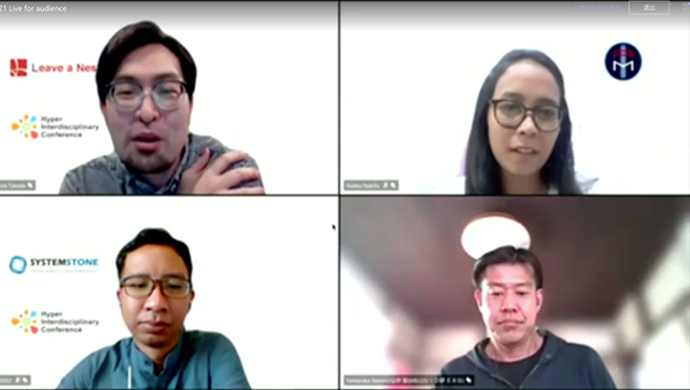
HIC2021 session with Mitsubishi Electric: Dr. Ryuta Takeda, Leave a Nest (upper left), Ms. Nadea Nabilla, Azura Marine Indonesia (upper right), Mr. Sittikorn Nualrod, System Stone (bottom left), Mr. Satoshi Yamanaka, Mitsubishi Electric (bottom right)
The rise in the use of video conferencing and business communication platforms like Zoom and Slack in 2020 quickly helped businesses operate virtually despite Covid-19 social distancing restrictions across Asia. However, while internal communications recovered quickly, the challenge lay in deal-making with new business partners or supporting nascent partnerships inked just prior to or during the pandemic.
The Hyper Interdisciplinary Conference in Singapore 2021 (HIC SG 2021) addressed these issues and more, centred around its theme of re-learning and adaptability. Hosted by Leave a Nest Singapore virtually out of Singapore on Feb 27, 2021, the full-day conference addressed current critical issues such as climate change, poverty, and healthcare needs.
HIC SG 2021 drew more than 500 startups, academic researchers, and multinational corporations (MNCs) from over 14 countries, bringing interdisciplinary experts to blend ideas and formulate solutions to these critical issues.
Collaboration to address critical issues
HIC SG 2021 envisions accelerating “knowledge manufacturing” across disciplines to solve deep issues in Southeast Asia and the world by discussing four key topics: the evolution of decentralized economies in Southeast Asia, unleashing foodtech for healthy living, evolving proof-of-concept (POC) collaborations without physical gatherings, and solving global issues with project design.
The first session on decentralized economies in Southeast Asia featured one such Southeast Asian-Japanese collaboration, between the world’s second-largest drone company Malaysia’s Aerodyne Group and Japan’s Autonomous Control Systems Laboratory, which was the first drone-maker to list publicly in December 2018.
Also read: Meet these 5 verified investors that are ready to connect with you today
The second session, meanwhile, focused on foodtech to unleash the potential of food for healthy living by leveraging science and technology. It tracked how Japan’s Rohto Pharmaceutical pivoted and expanded its remit to agriculture and food-related projects, taking a more holistic view of the healthcare sector.
Southeast Asia’s story of opportunity
The third session explored how PoC projects continued without face-to-face meetings in the Covid-19 era. Satoshi Yamanaka, senior manager at Mitsubishi Electric’s Center for Future Innovation, explained how the Japanese MNC continued working with several Southeast Asian startups.
He said: “At the Center for Future Innovation, we act as the focal point through which the startup ecosystem can actively collaborate and connect with all 10 of Mitsubishi Electric’s business units.”
The team has only two members — Yamanaka and Kenji Minefuji — a rare occurrence in the corporate innovation space. Together, Yamanaka and Minefuji have over 30 years of experience in R&D, engineering and technology development across several of Mitsubishi Electric’s diverse business units. Their shared expertise and extensive knowledge of the Japanese MNC’s inner processes have led to the Center for Future Innovation making several pivotal collaborations happen between Mitsubishi Electric and innovative Southeast Asian startups.
Mitsubishi Electric provided funding support for Azura Marine Indonesia, which has developed solar-powered electric motors that help fishermen save costs and the environment.
Also read: Scaling communities like startups
Another collaboration was with Thailand’s System Stone, which has developed Factorium, a mobile-based factory maintenance system that encourages preventive maintenance to reduce repair time by more than 30% and repair cases by 25%.
Its POC project involves testing Factorium’s data integration architecture by linking it to Mitsubishi Electric’s factory automation systems, which is used by many Thai manufacturers.
“For us, Southeast Asia represents a big opportunity, driven by the use of English as the region’s second language and its timezone difference of less than two hours from Japan,” he added.
Yamanaka noted that Japan’s treasure trove of technologies can be adapted to address issues prevalent in Southeast Asia, such as reducing factory downtimes and making its fishing industry more sustainable.
Bolstering partnerships in a pandemic
Seeing through both projects through 2020 became essential, as both factories and fisherfolk in Southeast Asia needed to automate quickly to keep costs low to survive the pandemic.
“Despite Covid-19 putting an end to face-to-face meetings, we continued to build on our POC projects. With System Stone, our Thailand team was directly involved with the POC so we had strong local support on the ground.
“Meanwhile, for Azura Marine, we stayed on point by keeping our shared vision in mind, to improve fishermen’s livelihoods and make fishing sustainable,” Yamanaka enthused.
Azura Marine Indonesia co-founder Nadea Nabilla said open and constant communication is key to maintaining trust.
System Stone CEO and co-founder Sittikorn Nualrod meanwhile noted the importance in understanding Mitsubishi Electric’s value propositions at the local Thai, regional Singaporean, and central Japan offices before any virtual meetings.
Also read: Twilio’s annual State of Customer Engagement report
The final session of HIC SG 2021 was focused on solving global issues with project design. The session featured Mitsui Chemicals Singapore R&D Centre’s nanocellulose applications across a range of interdisciplinary chemical reactions.
Mitsui Chemicals works with industry stakeholders such as companies and research institutes to catalyze innovation and create multiple products and services that are in harmony with society and the environment.
Its nanocellulose applications include collaborations with food and beverage packaging industry players to create sustainable or zero-waste foodware.
Building on the learnings of the four sessions and various interdisciplinary collaborations highlighted in HIC SG 2021, the theme of adaptability may continue in the next edition of the HIC in 2022. Moving forward, HIC will keep expanding on the theme of Japan-Southeast Asia collaborations, particularly with regards to Japanese MNCs tapping the Southeast Asian startup ecosystem to spur further innovation.
– –
This article is produced by the e27 team, sponsored by Leave-a-Nest
We can share your story at e27, too. Engage the Southeast Asian tech ecosystem by bringing your story to the world. Visit us at e27.co/advertise to get started.
The post Making cross-border partnerships work within a Covid-19 reality appeared first on e27.

